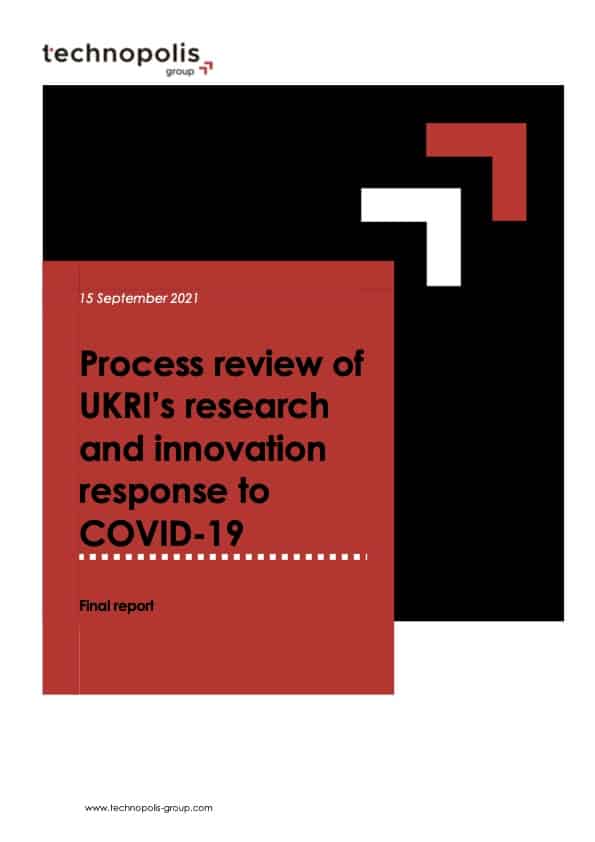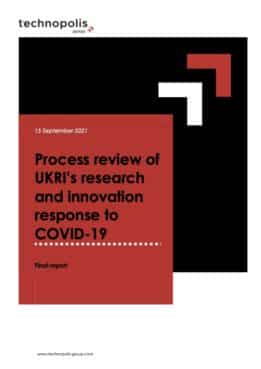Review of UKRI’s response to COVID-19
Publication date: 21 January 2022 | Report language: EN
This report presents the findings of a process review of UKRI’s research and innovation funding response to COVID-19. Areas of focus are its strategic rationale, governance, funding and process changes, operations and delivery, communications, assessment processes, and monitoring.
Our headline conclusion is that UKRI performed well in its function as a research and innovation funder under difficult conditions, having to process a substantially larger volume of applications at a much faster pace than would ordinarily be the case. Especially in the early months of the pandemic, UKRI rapidly funded a range of studies critical to the pandemic response. However, UKRI’s COVID-19 response was negatively affected by three partially related factors:
- UKRI’s target to process applications within a few weeks was missed across large portions of its portfolio. This was caused in part by the large volume of applications and consequent workload for staff and reviewers, but also by a funding shortfall in late summer of 2020, while HM Treasury was processing a business case to allow UKRI to re-allocate further funding to the COVID-19 response
- Beyond the early stages of the response, as government’s research-needs expanded from immediate ’pandemic response’ to a broader range of societal, economic, ecological and technological questions, UKRI had limited ability to engage in systematic priority- setting, i.e. of prioritising certain topics over others, or of using a range of different award types (including of different lengths to suit the urgency of different questions)
- UKRI’s grants application and management system, JeS/Siebel, was deemed unfit for purpose by the UKRI leadership, especially due to its inability to rapidly design, launch and run bespoke funding schemes UKRI-wide and at scale, and so much of the COVID-19 response was conducted off-system. This entailed running and organising calls via email and spreadsheets. It also meant there was limited availability of portfolio monitoring data.
We set out a number of recommendations in the concluding section of this report to help inform possible future crisis responses, some of which also pertain to post-pandemic business-as-usual. They include urgently replacing the JeS/Siebel system (as is already planned) with a system that enables rapid design and setup of bespoke schemes with individually tailored application formats and assessment processes, to create a small suite of different funding schemes for crisis- responses of all types, and to make use of these habitually (e.g. in smaller-scale crises). We also recommend closely replicating the governance structure used for the COVID-19 response for future large cross-council endeavours, and to ensure a rule-change on how UKRI can rapidly reallocate its budget in possible future crisis scenarios.
Below, we note our key findings in each of the main focus areas for this study.
Strategic rationale
Originating in part from central government, UKRI’s objective (or ‘mission’) in relation to COVID- 19 was to fund research relevant to the stated, emerging and potential needs of government and other actors (e.g. public services, private enterprise) dealing with all aspects of COVID-19 and its wider implications, and to produce impact or useable/actionable knowledge within the lifetime of short-to-medium term awards.
To achieve this aim, UKRI sought to execute the funding response as rapidly as possible, to fund across the disciplinary spectrum, to communicate with central government, and to mobilise the UK research and innovation community.
This overall mission remained consistent throughout and reflects UKRI’s overall organisational mission well. It is also similar to the stated objectives in response to COVID-19 of other research and innovation funders across the globe.
Importantly, UKRI’s COVID-19 response broadly divides into two parts. The first largely took place in the early months of the pandemic and was in many ways a ‘pandemic response’ broadly comparable to previous responses to pandemics such as Ebola and Zika, albeit at a larger scale. The second part, which notably encompasses the Agile Call, presents a funding response not just to the pandemic itself, but to the wider societal emergency that unfolded, including questions around the economic, societal and technological consequences of COVID-19 and its countermeasures. While there were precedents and existing guidelines for the first part of the response, this second element presented a genuinely new type of funding endeavour: other than rapid response schemes of a small number of research funders in countries that have recently experienced other societal emergencies, there is little prior experience or guidance to draw on. This also means that the scope for lessons and future optimisation is especially large for this second part of the response.
Governance
The first part of the COVID-19 response was largely led by UKRI’s regular governance structures, with MRC leading much of the funding work, and through interaction between SAGE and UKRI/MRC. For the Agile Call, a cross-UKRI Coordination Group was set up as the central part of the COVID-19 response governance, aided by an advisory expert Taskforce and a Working Group representing the operational and administrative level of UKRI.
UKRI COVID-19 governance arrangements worked very well, especially in terms of facilitating cross-council work through the establishment of a central Coordination Group with substantial decision-making power. The overall leadership of the UKRI Chief Executive, and especially of the Coordination Group chair, was widely praised. Consultees for this study often noted that cross-council collaboration worked exceptionally well compared with previous endeavours.
UKRI succeeded in supporting a large body of work that was broadly relevant to all aspects of the pandemic. Particularly in the first phase of the response, consultation with central government enabled clear communication of research needs, and large platform and consortia studies could be established and funded quickly to support the immediate pandemic response.
In collaboration with the governing Taskforce, UKRI established a set of strategic priority areas for funding within the Agile call. However, as the scope of research-needs broadened, there was a lack of systematic priority-setting in terms of which topics required an especially rapid response (e.g. to be able to yield relevant results on timelines bound by pending policy decisions). While there were many lines of communication between UKRI and central government, these resulted in a general list of priority topics, but not in more detailed prioritisation and specificity in terms of what kind of timelines and impact-pathways were needed for different topics.
Operations and delivery
UKRI excelled in terms of its service delivery. From external and internal perspectives alike, feedback on ease of application processes and robustness of assessment is overwhelmingly positive – award holders even tended to characterise UKRI’s service delivery as better than during pre-pandemic ‘business as usual’.
However, UKRI’s efforts to deliver a rapid funding service came at substantial personal cost in the shape of severe workload for both UKRI administrative staff and the community of reviewers and panellists. Large numbers of consultees for this study used terms such as ‘exhaustion’ and ‘burnout’ when describing the effect of UKRI staff having to process a high volume of applications so rapidly. Further, despite the substantial efforts put in by UKRI staff, the volume of applications and staff and reviewer capacity meant that the time-to-grant target of up to six weeks was missed frequently: our findings suggest that over a third of award holders waited more than 10 weeks for a decision.
These delays were especially pronounced in the Agile Call and were substantially exacerbated in the late summer of 2020 as UKRI was waiting for a decision by HM Treasury on a business case to reallocate additional budget to the COVID-19 response.
Communications
UKRI successfully mobilised large parts of the UK research base, at first in the shape of rapidly identifying and supporting key parts of the research system in core tasks critical to the pandemic response, and then in a much broader sense, supporting a large body of awards relating to a wide range of issues around the pandemic and its wider implications. In total, over 6,300 applications were received across the main UKRI calls.
Our survey data also suggest that the aims of calls and investments, as well as UKRI’s overall mission as described above, were clearly communicated both internally and to award holders. The open calls did attract a substantial amount of out-of-scope and/or unfundable proposals (alongside many good ones), but our research suggests this is attributable to factors other than UKRI’s communication of aims to potential applicants.
Funding and assessment processes
At the start of the pandemic, UKRI used a range of iterative processes to set up and fund the major consortia and platform studies critical to the pandemic response. For much of the remainder of the response, funding processes strongly resembled business-as-usual, with peer and panel review used throughout, and with minor differences between the Research Councils and small modifications in the later stages of the response. In effect, processes were accelerated, but not significantly simplified to aid that acceleration.
Several funders covered by our international review had schemes using alternative funding processes designed to reduce the peer review burden (including the burden on staff to organise it) or, for smaller and especially urgent investments, to bypass it completely. Other than for specific individual award investments and the recent COVID-19 Urgency Grants, UKRI undertook little experimentation and diversification of funding processes. In part, this is a result of the limited priority-setting (especially for the Agile Call), which left little scope to consider different award types (e.g. sizes, levels of urgency) with different processes for each.
Monitoring and IT systems
Large parts of UKRI’s COVID-19 funding response were conducted ‘off-system’, relying in large part on application submission via email and administration via MS Word and spreadsheet documents, until JeS/Siebel was brought back into most parts of the process in August 2020 (though it remains out of use for the COVID-19 Urgency Grants scheme launched in Jan 2021).
A main reason for this decision was that it was not possible with JeS/Siebel to set up a bespoke UKRI-wide COVID-19 response call rapidly, let alone a suite of calls that may have been suited to different levels of topical urgency and award ‘types’.
It also meant a reduced availability of portfolio monitoring data (including EDI data) in the early and mid-stages of the COVID-19 response, which may have provided valuable evidence. The system is now active, and tailored surveys are being carried out on a regular basis to ensure progress reporting on all funded awards, so aside from comprehensive EDI and unsuccessful applicants data, UKRI is now well set up for the evaluation of the outcomes of the funded work.







